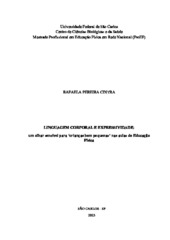Linguagem corporal e expressividade: um olhar sensível para ‘crianças bem pequenas’ nas aulas de educação física
Resumo
When we turn our gaze to the beginning of human development, we are faced with a vast field of experiences and experiments of 'very young children' to discover the world and themselves. As the guiding thread of the entire discovery process, we have the body that expresses itself through its movements in the most varied ways. This research aimed to identify and analyze the narratives about/with the body woven in the different relationships experienced by 'very young children' in Physical Education classes. This is qualitative research developed through a research of the type of pedagogical intervention by the teacher-researcher, aiming at the planning and carrying out of educational actions. The participants were early childhood education students regularly enrolled in Group 2 (G2), aged two years old, from a school in the upstate of Minas Gerais. There was the systematization of a Didactic Unit (DU), which included twelve classes evidenced by body language and expressiveness. In this DU, ludic pedagogical propositions were organized that favored meaningful learning for students by focusing on body language with the movement themes proposed by Rudolf Laban, as well as proposing an approximation and articulation to the Experiences Fields of the National Common Curricular Base (BNCC). The experience lived during the proposals for exploring spaces, times, situations and materials was recorded through field diaries, photos and videos. The data produced in the field went through the Discursive Textual Analysis process which, in dialogue with the theoretical foundation, led to the construction of two metatexts: Body is Language: children's expressiveness through movement; and Field Experience and the Experiences Fields. The research also provided the opportunity to create a website as an Educational Product so that the whole experience of building and applying this Didactic Unit can be shared, as well as the experience of ‘very young children’.
Collections
Os arquivos de licença a seguir estão associados a este item:

